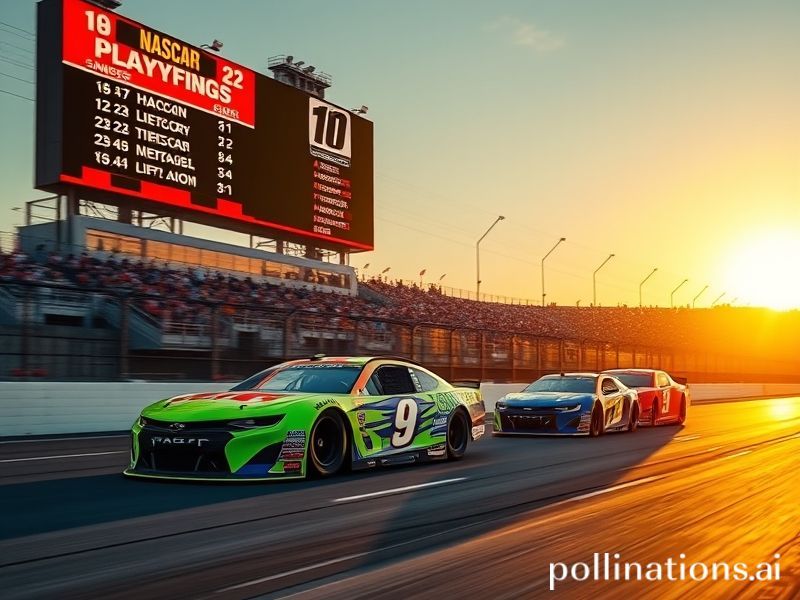Left Turns, Global Burns: Why the Whole World Is Quietly Watching NASCAR’s Playoff Standings
**The Great American Oval: How NASCAR’s Playoff Standings Became a Global Morality Play**
In a week when the UN Security Council couldn’t agree on the definition of “cease-fire” and the Arctic registered its first 30 °C day, the planet nevertheless paused—if only for the length of a fuel run—to ask: who the hell is leading the NASCAR Cup Series playoffs? To the average Berliner, that question ranks somewhere between “What is NASCAR?” and “Why is NASCAR?” on the urgency index. Yet here we are, because in 2024 even a sport devoted to left turns has become a geopolitical mood ring.
The current standings have Kyle Larson perched atop the points like a bald eagle on a meth-laced Monster can, chased by a murderer’s row of Floridian hotshoes and one polite Canadian who apologizes after every wreck. Tyler Reddick, a man whose surname sounds like a Dickensian pickpocket, is second, proving that destiny has both a cruel and literal sense of humor. Meanwhile, Denny Hamlin—whose perpetual scowl has been likened to a sanctions-weary Moscow diplomat—lurks in third, biding time until the next short-track skirmish erupts like a proxy war on asphalt.
From Geneva to Guangzhou, the playoffs function as a convenient allegory for late-stage capitalism: 750-horsepower billboards circulating an oval, burning ethanol subsidized by corn lobbyists, while data analysts in Bangalore crunch tire pressures for hedge funds that long ago diversified into carbon credits. The French, who still insist the 24 Hours of Le Mans is the summit of motorsport, sniff that NASCAR is just “pro wrestling with lug nuts”; the Saudis, ever sniffing for new blood sports, politely inquire about hosting a night race outside Riyadh—strictly for “economic diversification,” of course.
But the numbers travel. Viewership streams spike in Brazil, where fans recognize the playoff format as their own congressional impeachment process—only faster and with fewer indictments. In Seoul, esports broadcasters simulcast the race on LED skyscrapers, overlaying Twitch chat so local teens can argue whether William Byron’s beard constitutes cultural appropriation. Even Kyiv, blacked-out and grim, finds solace in the fact that at least Martinsville Speedway still has reliable electricity, even if it’s generated by the same grid that keeps North Carolina vape shops humming.
For multinational sponsors, the playoffs are a master class in weaponized nostalgia. Coca-Cola repaints its cans in camouflage for Veterans Day weekend, Amazon Web Services promises “cloud-enabled overtakes,” and a certain European luxury carmaker quietly funds a documentary about stock-car heritage—conveniently timed to distract from its own diesel-scandal sentencing. Each banner draped over the catchfence is a tiny Versailles treaty of brand diplomacy: the victor writes the hashtags, the vanquished pays the invoice.
And what of the drivers themselves, these gladiators in moisture-wicking balaclavas? They speak of “momentum” and “execution” in the same cadence Ukrainian artillery officers describe “counter-offensives.” Both know that one errant lug nut, one bureaucratic miscalculation, can turn a season—or a country—into scrap metal. Larson, asked about global supply-chain disruptions, shrugs: “If we can’t get enough Goodyears, we’ll just run faster on three.” Somewhere, a World Bank economist files that under “adaptive resilience.”
So as the Round of 8 looms, remember that every restart is a miniature climate summit: 40 stakeholders, one planet, zero consensus, full throttle. The checkered flag may wave in Homestead, but the aftershocks ripple outward—through currency markets tracking tire-compound tariffs, through diplomatic cables analyzing post-race fistfights, through TikTok feeds where Kazakh teens lip-sync to the national anthem played during pace laps.
In the end, the standings are less a leaderboard than a seismograph of our anxious little globe, tracing tiny tremors around an oval until, inevitably, something spins out and catches fire. Which, come to think of it, is exactly how most international news cycles end anyway. Gentlemen and very few ladies, start your engines—and your coping mechanisms.







